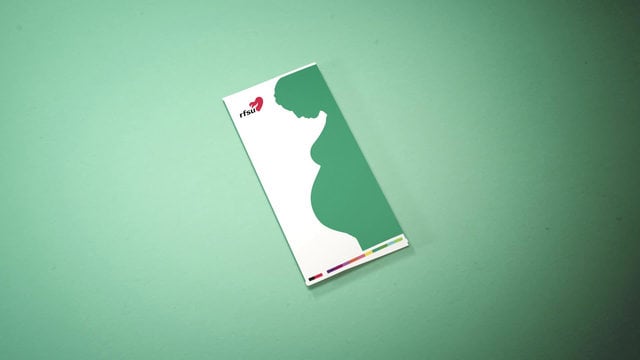
After giving birth
View as text
RFSU provides information about what happens after childbirth
After giving birth, the body resets and many women are affected both physically and emotionally. You may feel depressed or elated. Immediately after childbirth, it is good to be close to the baby as much as possible. Physical contact is good for bonding and helps stimulate the production of breast milk.
Immediately after birth, the baby usually breastfeeds and then sleeps for a while. When the baby wakes up, it is common for it to want to breastfeed a lot and often. If breastfeeding or bottle feeding feel difficult, it is important to get help.
After labor, the uterus contracts, which causes afterbirth pains. This can hurt, but it is necessary for the uterus to heal and to reduce bleeding. Painkillers can alleviate the pain. It commonly takes about four weeks for the wounds in the uterus to heal completely and for bleeding to stop. This bleeding is not dangerous, but if it smells bad or if you have pain and fever, it may be a sign of a uterine infection. In that case, you should seek medical care immediately.
When you give birth vaginally, it is common to have painful tears and small injuries in the genitals and it may hurt when you pee and poop. If you are tender and swollen, a cold towel or something soft to sit on can help alleviate the pain. If you have had a C-section, you may have a lot of pain in your belly and around the surgical incision. Even though it’s painful, it is important to start moving around. That will help you heal faster and reduce the risk of blood clots and constipation. But avoid heavy lifting. Getting rest and drinking plenty of fluids will help your body recover.
After childbirth, it is important to visit a midwife for check-ups in order to be examined and to make sure everything is going well. If you have severe maternal childbirth injuries that continue to be painful you should not hesitate to seek help, even if a lot of time has passed since giving birth.
Pregnancy and childbirth both put a huge amount of stress on the pelvis. If you have pain that does not go away after several months, you should seek help.
The pelvic muscles stretch out during childbirth, which means you may have urine leakage, and it can be hard to hold in gas. Some people may have stool leakage. Kegel exercises are an effective way to re-strengthen the pelvic muscles. Relax your body and practice tightening the muscles from the rectum to the vagina
Hemorrhoids are common both during and after pregnancy. Hemorrhoids can be treated with over-the-counter medications.
It is common for your sex life to be impacted when you have a new baby. For many women, this is a time of reduced sexual desire. Many have pain in the vulva and vagina, or in the belly after a C-section. Pay attention to how it feels and let your body heal and recover. Before having sex, it is important to remember to use contraception if you do not want to get pregnant again.
If you need advice, have problems or feel worried, seek care immediately from a midwife clinic, gynecologist or medical center. Everyone has the right to good medical care, support and help after childbirth.
About the video
The period after giving birth is often a huge adjustment, both physically and mentally. In this video you learn what happens in your body after giving birth, how you can ease any problems you have and where you can turn if you have problems after having a baby.
Questions to think about after the video
- Is there anything in the video you think is especially interesting?
- Giving birth can trigger a lot of emotions, both positive and negative. What is the best way to support someone who is in a negative mental state after giving birth? What can the period after the birth of a baby be like for the parent who didn’t give birth?
- It is common to feel less sexual desire for a while after giving birth. Pain, stress and tiredness can affect desire. A person never has to agree to sex if they don’t feel like it. What feelings can be triggered by reduced sexual desire? What can a person do to be intimate with their partner without having sex?
Do you want to talk about the video?
Talking with someone about the video can feel important and give new insights. You might have questions and thoughts that are good to discuss with others rather than just thinking about them on your own. By sharing and listening to each other, we can get support and learn together.
Would you like to start a group and talk about the videos? Here are some tips about what you can do.
